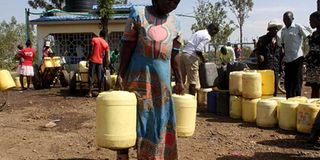Water bills for Kisumu residents to rise as new tariffs effected

A woman fetches water at the Awasi water point in Kisumu. Residents of the county will now pay more for water after the region’s regulatory authority revised tariffs upwards. FILE PHOTO | NATION MEDIA GROUP
What you need to know:
- Those consuming at least 300 cubic meters have had their tariffs increase by Sh10 from Sh130 to Sh140.
- Government institutions have also been affected and will pay the same rate.
- public schools, universities and colleges consuming from zero to 600 cubic meters will pay Sh8 more from Sh40 to Sh48.
Residents of Kisumu County and its environs will have to dig deeper into their pockets to pay water bills after the region’s regulatory authority revised tariffs upwards.
The Water Services Regulatory Board has approved the regular tariff adjustment for the precious commodity for Kisumu Water and Sewerage Company (Kiwasco).
Through a gazette notice, the board’s chief executive officer Robert Gakubia indicated that for residential and domestic customers consuming between zero and six cubic metres of water, the rates have increased from Sh33 per cubic metre to Sh300.
Those consuming at least 300 cubic metres have had their tariffs increased by Sh10, from Sh130 to Sh140.
INDUSTRIAL USE
“Those using water for commercial or industrial purposes will have to cough out Sh330 up from the previous tariff of Sh40 for those who use from zero to six cubic meters of water,” read the notice dated March 24, 2017.
Government institutions have also been affected and will pay the same rate.
Lake Victoria Water Services Board has given a month’s notice to all existing and potential consumers of water and sewerage services in Kisumu on the changes of tariffs.
For public schools, universities and colleges, those consuming from zero to 600 cubic metres will pay Sh8 more from Sh40 to Sh48.
Those involved in illegal connections for commercial use will face stiffer penalties after the regulator approved a fine of Sh100,000 besides paying for the amount of water estimated to have been consumed during the period of the illegality.
For domestic users who violate the same law, the fine is even higher, from Sh5,000 to Sh300,000.





